SHAKE-SPEARE in Italy
The Queen's Lord Great Chamberlain pestered her so long for permission to travel until she gave in. Equipped with a letter of introduction from the Queen to King Maximilian II and his Tuscan relatives, the twentyfour year old set off, with an entourage of escorts and servants, to travel through France and Italy. Two weeks after his departure it was discovered that Anne Cecil, Countess of Oxford, was pregnant. The young Earl didn't consider this to be reason enough to interrupt his travels.
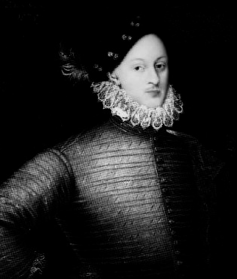
From Paris, he sent a portrait of himself to his wife and the following reassuring words to his father in law, Lord Burghley.
My Lord, your letters have made me a glad man, for these last have put me in assurance of that good fortune which your former mentioned doubtfully. I thank God therefore, with your Lordship, that it hath pleased Him to make me a father where your Lordship is a grandfather and, if it be a boy, I shall likewise be the partaker with you in a greater contentation. But thereby to take an occasion to return, I am far off from that opinion, for now it hath pleased God to give me a son of my own (as I hope it is), methinks I have the better occasion to travel sith, whatsoever becometh of me, I leave behind me one to supply my duty and service either to my prince or else my country.
In the Louvre Palace, the young King Henri III introduced Edward de Vere to France's most influential personages, among others; the entire courtly entourage: the Queen Mother Catarina de Medici- Henri's sister Marguerite de Valois (Margot) and his brother Hercule-François Duke of Alençon (Monsieur) - Marguerite's husband, Henri, King of Navarre (latter Henri IV) - the brothers Henri de Lorraine, Duke of Guise and Charles of Lorraine Duke of Mayenne.
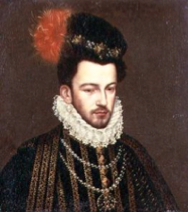
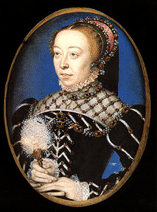
Henri III, Roi de France / Catarina de’ Medici
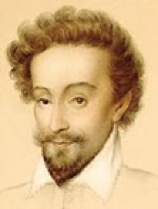
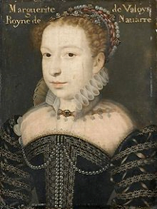
Henri, Roi de Navarre / Marguerite de Valois
Rarely was such a divers collection of personalities gathered under one roof: the scheming Catarina who was largely responsible for the St. Bartholomew's Day massacre- Henri III; one minute moralistic religious fervour, down right debauchery the next- Hercule-François his ambitious brother- the brilliant Queen Margot- Henri de Navarre, the cheerful natured tactician- and the cool, arrogant Henri, Duke of Guise. In the same year -1575 - the Duke of Alençon, being the ringleader of the malcontents, fled the Louvre Palace. Henri de Navarre was soon to follow him after being kept in the palace as a prisoner of the state since 1572. Henri, Duke of Guise advanced to being the leader of the Catholic league and as such, Henri III ordered his murder in 1588.
In the middle of March 1575 Oxford continued his journey, first going to Strasbourg where he stayed with the humanist, Johannes Sturmius, a staunch supporter of Queen Elizabeth.
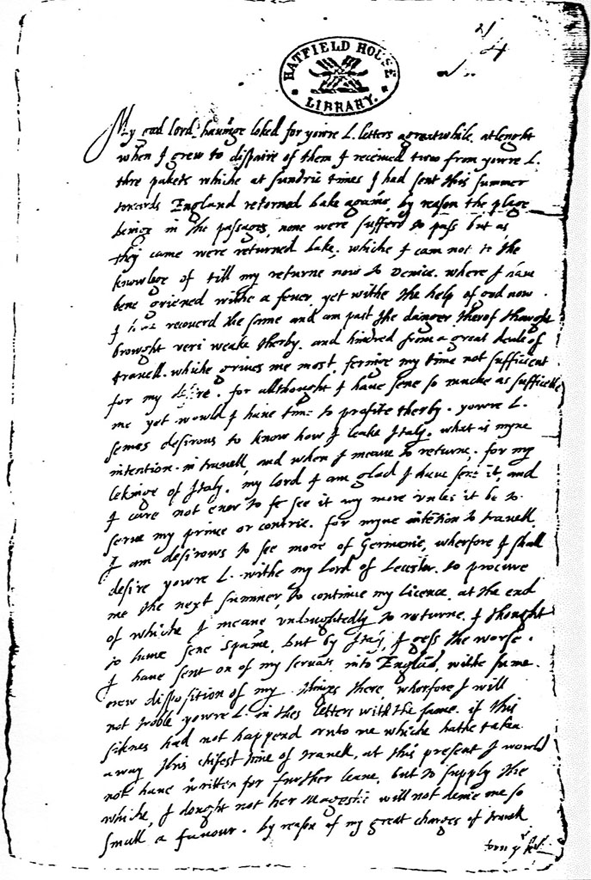
Oxford’s Letter to William Cecil, Lord Burghley, 24 September 1575
The Earl stayed in Italy for almost a year and during this time he visited Venice (under the rule of the Doge Alvise Mocenigo I), Padua, Genoa, Milan, Bologna, Florence (under the rule of Francesco de Medici, Grand Duke of Tuscany), Siena, and more than likely also Mantua (under Duke Guglielmo Gonzaga) and Ferrara (under Duke Alfonso II d' Este).
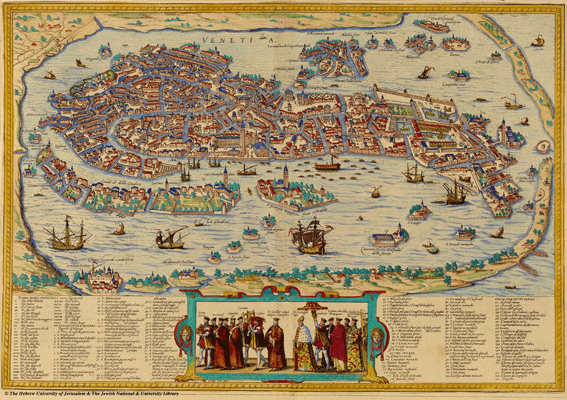
To end his financial problems, the Earl decided to sell some of his lands. Having a non-bourgeois point of view, he says: Mine is made to serve me, and myself not mine.
Whereupon till all such encumbrances be passed over, and till I can better settle myself at home, I have determined to continue my travel, the which thing in no wise I desire your Lordship to hinder, unless you would have it thus Ut nulla sit inter nos amicitia [that our friendship be over]. For having made an end of all hope to help myself by her Majesty's service, considering that my youth is objected unto me, and for every step of mine a block is found to be laid in my way, I see it is but vain calcitrare contra li buoi [to kick against the oxen] and, the worst of things being known, they are the more easier to be provided for, to bear and support them with patiency. Wherefore, for things passed amiss, to repent them it is too late, to help them (which I cannot, but ease them) that I am determined, to hope for anything I do not; but if anything do happen praeter spem [contrary to expectations], I think before that time I must be so old, as my sons who shall enjoy them must give the thanks, and I am to content myself according to this English proverb, that it is my hap to starve like the horse whilst the grass doth grow.
(Letter to Lord Burghley, 3 January 1576)
Oxford believes that the Queen will not take him into her employ and that no gain could be made by arguing with her decision. Thereby he make an amusing play on the biblical expression “To kick against the pricks” (from the acts of the apostles), relating to the pointlessness of the oxen kicking against the goads that were used on them when they were pulling ploughs, and has come to be synonymous with rebellion doomed to failure; he says: “I see it is but vain to kick against the oxen”. He accepts his fate stoically, hardly expecting any help from the crown, (not then at any rate) and knowing that there's nothing he can do to remedy the matter. “While the grass grows the seed starves” is the expression that springs to Oxford's mind and we are not surprised to see that the same expression springs to Shakespeare's pen in “Hamlet” (III/2)
HAMLET. Sir, I lack advancement.
ROSENCRANTZ. How can that be when you have the voice of the
king himself for your succession in Denmark?
HAMLET. Ay, sir, but 'while the grass grows' —the proverb
is something musty.
On the Monday before lent 1576, two days before the pestilence broke out; the Earl left Venice and rode to Calais via Lyon and Paris through the scourges of the French civil war.
On the crossing from France to England on 13 or 14 April 1576 the Earl was attacked by pirates and Dutch marauders; they robbed him and took him prisoner. The Privy Council had to send a diplomat to Prince William of Orange to negotiate the matter.
Thirty years later Nathaniel Baxter writes an account of the journey: “Naked we landed out of Italy, / Enthralled by pirates, men of no regard“. The events had had thirty years to ferment in his lively imagination, so we can allow for mild exaggeration.
